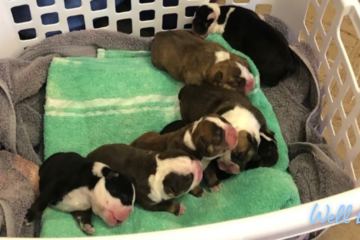You’re quite certain that your dog is the most perfect creature to ever walk the earth, and you’d love to have another one just like them. You decide that the logical next step is to find them a partner and plan for puppies. But before you jump in with all paws, consider the magnitude of your decision. You will be producing someone’s best friend! One of these puppies might be the reason that someone gets up in the morning. Another could be the owner’s excuse to meet people. A third may be the way a child learns how to care for another creature. Someone will love these puppies with their whole heart and will be devastated if they get sick or injured. Someone will cry inconsolably when someday, hopefully far in the distant future, these puppies’ muzzles have grayed and they say their final goodbye. The decision to bring life into this world is not one that should be made lightly or without preparation, so before you bring over that cute dog from next door, consider the following questions.
1) Are both parents physically AND genetically healthy?
If you’ve ever cared for a pet with a health problem, you know how challenging it can be. Before deciding to breed, well before she’s in heat, schedule a “breeding soundness exam” with a breeder-supportive veterinarian. Tell them that you plan to breed her/him. The vet will check eyes, ears, skin, heart, lungs, joints, belly, and reproductive organs to make sure everything is in tip-top shape. Depending on your dog’s breed, your vet may need to take X-rays of your dog’s joints or you may need to schedule additional screening tests with a specialist such as a cardiologist or an ophthalmologist. You can get more information on these types of tests by visiting https://www.ofa.org/
2) Are both parents protected from disease?
If either parent is due for vaccines, they should get titers and/or vaccine boosters well before the breeding is scheduled. This is important for both parents but is especially important for the mother. She will pass immunity to her puppies through her colostrum, so it is critical for the health of the puppies that her immune system is protected. She should also be protected against heartworm disease, fleas, and ticks with preventatives. Not all products are safe during pregnancy, so make sure you discuss the best product for your dog with your breeder-supportive veterinarian.
3) Have both dogs been tested for brucellosis?
This is very, very important. Brucellosis is an infectious disease that can be transmitted between dogs via bodily fluids, including respiratory fluids (coughing, sneezing, saliva) and reproductive fluids. Both parents should be tested for this disease before breeding. There is NO approved treatment for this disease in dogs and the current recommendation for affected dogs is euthanasia. The reason for the severity of this recommendation is because brucellosis is zoonotic, which means it can be transmitted to humans. There has been a recent increase in the number of cases of brucellosis in the United States. Don’t skip this step, get them tested!
4) Are both parents behaviorally healthy?
Behavior is part nature and part nurture. Because the mother will teach her puppies from the moment they’re born, we should only breed dogs with excellent temperaments. The one possible exception would be dogs who are purpose-bred for protective work. If you are planning on producing puppies to be family pets, the parents should be free of behavioral problems such as anxiety or aggression.
5) Is it safe?
Pregnancy is a beautiful thing, but it’s also really hard on momma’s body. Avoid breeding when she’s either too young or when she’s over the hill. The age range at which pregnancy is appropriate depends on the breed, so make sure to discuss this factor with your veterinarian. You might also need to discuss factors such as her risk for difficulty whelping, as certain breeds are more likely to have difficulty than others.
6) Do you know where the puppies will go?
You are responsible for the lives you bring into this world. Have you identified homes for the future puppies? Are you prepared to take the puppies back from their new homes at any point in the entirety of their life if the new family is no longer to keep them? Make sure you have a plan for these puppies so they don’t end up on the street or euthanized in a shelter.
7) Do you have a relationship with a veterinarian who can help you with reproductive health?
Your family doctor would refer you to an OBGYN if you were having a [human] baby, and your dog’s care is just the same. While your dog’s regular veterinarian undoubtedly had some basic reproductive instruction in vet school, they may prefer to refer to a veterinarian with experience in reproductive health for your dog’s pregnancy. This may mean that you have to go to a different clinic for reproductive care, or they may have a reproductive vet that they consult via phone or email. Pregnancy is a team sport, and your team needs to be well-organized before the championship!
8) Are you prepared for emergencies?
We all hope that pregnancy will sail smoothly and whelping will proceed without a hitch, but many times this is not the case. Do you have a whelping kit assembled? Do you know what to look for to know when she needs a c-section? Are you prepared to feed puppies every 2 hours around the clock (yes, even at night) if momma isn’t able to nurse them? Do you have money saved up for emergencies? C-sections, in particular, are often several thousand dollars (check the prices in your local area), and hospitalization for a sick momma or babies can also add up. Don’t make the mistake of telling yourself it won’t happen to you, save up ahead of time. You may also consider pet insurance, but be sure to read the fine print, as many programs won’t cover reproductive expenses.
To breed your dog responsibly, there are many factors to consider, and it’s important to separate these factors from emotion. If your answer to each of the above questions isn’t an enthusiastic “Yes!” then you’ll need to reconsider. By waiting for the right timing with the right individuals, we can work together to ensure that all dogs have a loving home from the moment they’re born and stay as healthy as possible until their last goodbye.



0 Comments